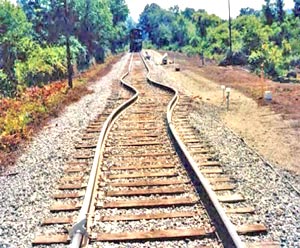
Tipping Point: Capitalist Climate Crisis Calls for Communist Revolution
Dialectical Materialism Helps Us Understand and Make Change
July 26— It’s hot. Temperatures are breaking records on every continent. Then breaking them again. This couldn’t be happening without global warming caused by capitalism. And capitalism won’t save us from itself.
“Warming Could Push the Atlantic Past a ‘Tipping Point’ This Century,” headlines warn. The phrase “tipping point” comes up often.
A “tipping point” can mean two things. First, it can mean that a quantitative change in something like temperature is causing a qualitative change. For example, railroad tracks get hotter, little by little, until they buckle. Or the Arctic ice sheet melts away, bit by bit, until no ice is left.
A “tipping point” can also mean that the qualitative change is irreversible. That there’s no going back. Buckled railroad tracks won’t ever straighten themselves out. They are not railroad tracks any more. They are scrap metal.
The Arctic ice sheet will probably reappear as the earth’s orbit tips the north pole away from the sun. But what effect is it having on the Atlantic Ocean?
Sometimes irreversible change is described as the “negation of the negation.” “Negation” doesn’t mean “saying no.” It means ceasing to exist in the old way, although keeping aspects of what it once was.
Iron ore remained iron when it was smelted and ceased to be ore. The train tracks ceased to exist when the heat made them buckle. They stayed iron, but they didn’t turn back into ore.
“Quantitative change becoming qualitative change” and the “negation of the negation” are examples of dialectical materialist laws. Here “laws” mean generalizations we see in the world. Dialectical laws are very general.
We understand the climate emergency better when we use the communist philosophy of dialectical materialism to analyze the information scientists are gathering.
We will also understand better how to mobilize to destroy capitalism as soon as possible. Before it does more irreversible damage to Earth and everything living on it.
For example: How do we build communist relationships that bring many more people into Party collectives – and keep them?
We start with people we know. We have something in common with them, but also differences.
If we spend just a little time together, we don’t become friends. If we only share a little about ourselves, they don’t become friends. But when we spend enough time, and open up enough, “quantity” can become “quality.” We can become friends.
More conversations discover or develop more shared values and aims. We become more aware of how much we are dedicated to the same struggle. We develop more confidence in working through disagreements. More confidence in the Party.
We learn that our disagreements are secondary, and agreement is primary. That struggle continues inside the party. A qualitative change from “friend” to “Party member” becomes possible.
Unfortunately, that qualitative change is not irreversible. Sometimes comrades quit. We have more to learn about how to avoid that.
The “laws of dialectics” don’t explain anything through abstract generalities. To understand something, we must get into concrete particulars. That might mean the failure of the 20th century communist movement. Or the immediate tasks facing our collective. Or the nature of a particular friendship.
Or the climate crisis.
Take the AMOC system in the North Atlantic. It is a very, very slow current system that circulates water from north to south and back. It’s driven by changes in the ocean’s temperature and saltiness. It warms Europe and carries nutrients that sustain ocean life.
The oceans are heating up, bit by bit. The melting Arctic ice sends more freshwater into the ocean. Ocean water becomes less dense, less salty, and less able to sink. AMOC slows down even more.
Scientists see evidence of an approaching qualitative change (tipping point) where the AMOC system would collapse. That would mean a much colder Scandinavia and much hotter tropical areas. Changed global rainfall patterns. More carbon in the atmosphere, accelerating global warming.
So far, this qualitative change isn’t inevitable. But the capitalist profit system stands in the way of reversing the process. If you didn’t already think that communist revolution is urgent, maybe this will be a “tipping point” for you.
The climate crisis is flooding our class siblings out of their homes from Vermont (USA) to Pakistan and the south Pacific. It’s killing migrants trapped in baking deserts from Arizona (USA) to Tunisia.
Future articles will try to help us understand this better by looking at the many “tipping points” of the climate crisis. And at how dialectical materialism can help us transform our world.
See ICWP on negation of the negation here

